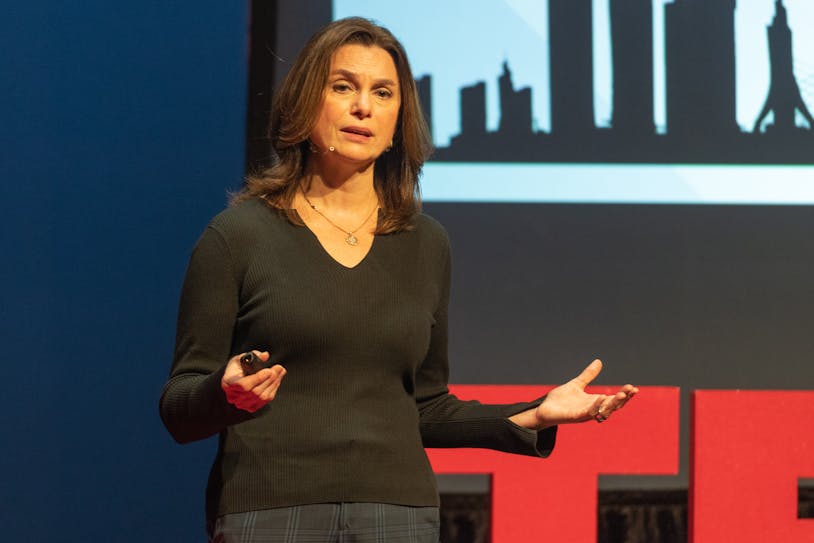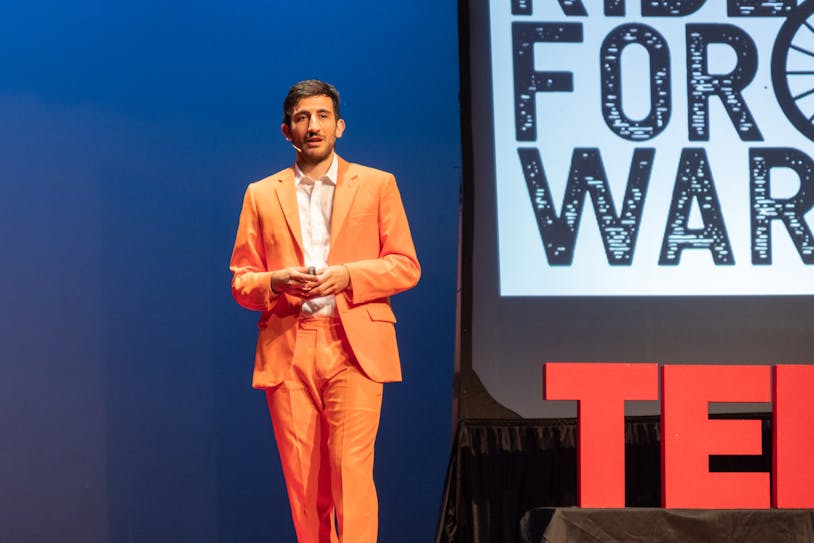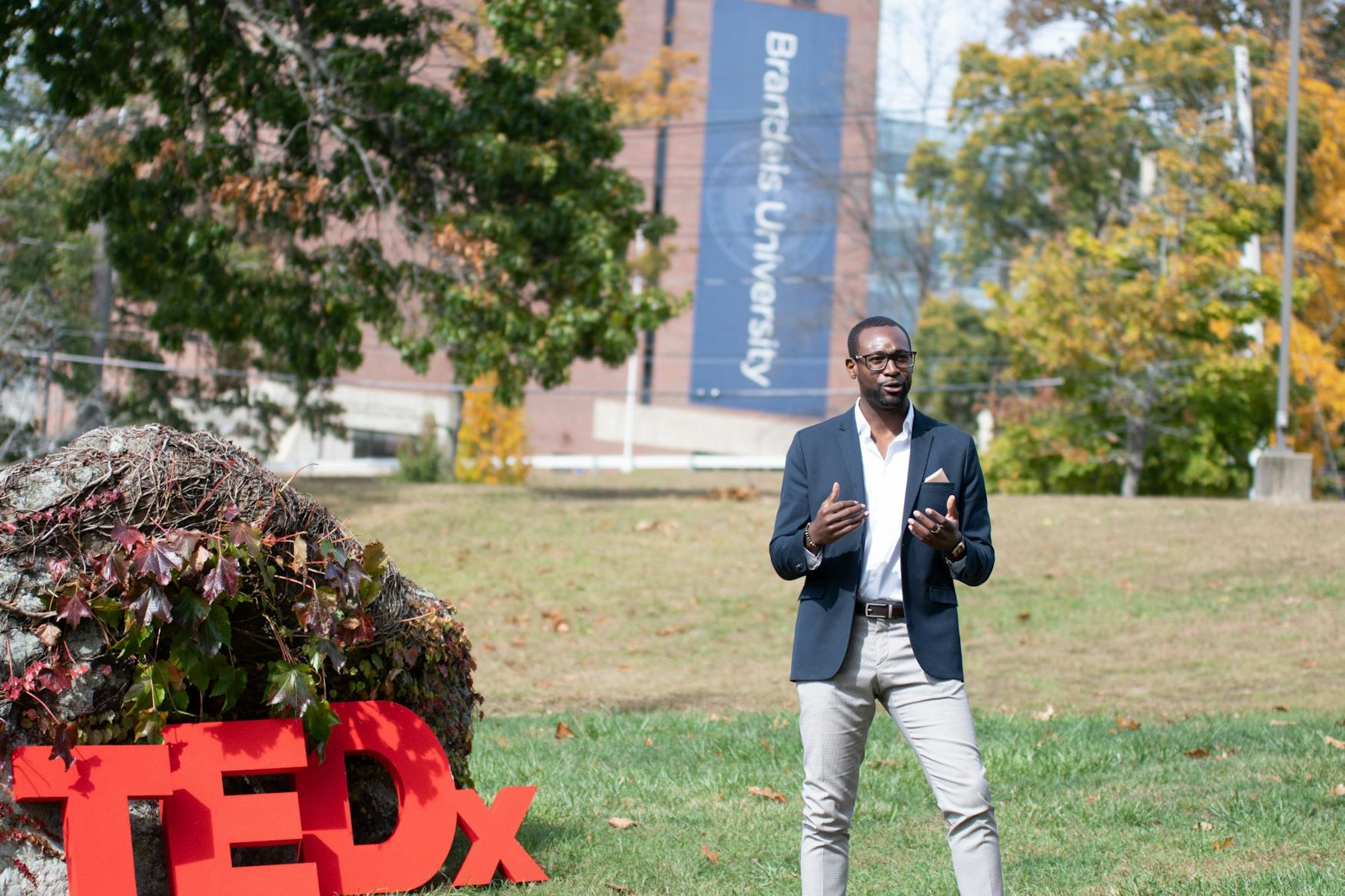TEDxBrandeisUniversity streams pre-recorded speeches by its five speakers
The speeches focused on “wellness in the new age.”
Student club TEDxBrandeisUniversity hosted its annual event on Nov. 1. The event, which had been postponed twice, once because of COVID-19 restrictions, featured speeches from Ruben Kanya ’14, Prof. Kristen Lucken (IGS), Eric Moyal ’17, M.A. ’18, M.S. ’21, Henry Chen ’23 and Mendel Weintraub ’21, all under the topic of “Wellness in the New Age.” These speeches, recorded on Oct. 14 by Media Technology Services, were streamed on Facebook Live and in a Zoom watch party. Each of the speakers interpreted this prompt differently, all expressing some sort of vulnerability to their virtual audiences.
The interludes between the speeches contained short segments from Brandeis staff members Colby Sim and Lucas Malo from the Department of Community Service and Leah Berkenwald from Health and Wellness Promotion about what wellness means to them and how they incorporate wellness into their daily lives.
Ruben Kanya
Kanya’s speech was titled “How To Get More Than 24 Hours in Your Day.” Kanya discussed what helped him be successful in his business endeavors in the form of tips. Kanya’s tips are designed to maximize people’s productivity during the day by talking about the amount of time that they have and how they use it. Kanya started by asking people to calculate the amount of time they spend doing their daily activities, ranging from homework to spending time on social media. Kanya proceeded to give an analogy to show how time can be “something we create rather than something we consume.” In Kanya’s analogy, “Adam” and “Sally” were both aspiring CEOs of companies. However, they took different approaches to their ways of life. While Adam aspired to do all of the work himself and lost time to learn how to do tasks, Sally utilized her connections to “create time” in her day.
Kanya has used these skills to become the founder of The Real Estate Experiment and director of Invested Talent.
Kristen Lucken
The next speaker, Lucken, discussed the power of religion in her life in her speech titled “Religion, Science, and the Nature of Human Life.” Lucken began by recounting memories of life in Yugoslavia in 1990. When places of worship were closed to the public, there was a fear that the unrest in society would lead to the downfall of humanity, she explained.
Lucken mentioned that religion has been a powerful source of comfort during the pandemic. People have been able to virtually come together for religious gatherings, ranging from standard weekly prayer sessions to major life celebrations of a Jewish Bris or a Catholic Baptism.
Lucken also spoke about the power of science in her life. She mentioned that while science asks the realistic “how” questions, religion has the task of asking the philosophical “why” questions.

Professor Lucken discussed the role of religion in her life and how it relates to wellness.
Eric Moyal
Moyal was moved to tears during his speech, “Restoring Visibility,” which talked about Complex Regional Pain Syndrome and Thoracic Outlet Syndrome. These are the conditions that his sister, Anais, suffers from as a result of a biking accident. Even though Moyal lives on the opposite side of the country from Anais, the two have been able to maintain a strong relationship with each other. Moyal founded “Ride for Warriors,” a bike trip fundraiser that went from his home in Massachusetts to Anais in Florida, to help raise money for CRPS, which according to Moyal is one of the most painful chronic conditions a person can have.
Moyal ended the speech by bringing up Christine Miserando’s Spoon Theory, in which every person is given 12 spoons every day, and every daily activity has a quantitative number of spoons attached to it. The Spoon Theory talks about how daily activities require more energy when living with a chronic illness, as opposed to a neurotypical human. For that reason, he has learned that he should send affirmative text messages to Anais without always expecting a response.

Moyal discussed his experiences with chronic pain conditions in his family.
Henry Chen
Chen spoke about the friendships he has made through online gaming in his speech titled, “E-Culture: Intimacy through Anonymity.” The talk featured stories of how Chen met some of his closest friends through anonymous online gaming. Unlike friendships in real life, people who meet online have the opportunity to maintain friendships with people from around the world without knowing what the other person looks like, he explained. Chen uses services such as Discord to make these correspondences possible. Chen was particularly proud of his online friend, Melvin, who overcame social anxiety with Chen’s help and is now thriving at his university, so much so that Melvin now prefers in-person friends to online friends.

Chen shared the power of online gaming as a tool for making friends.
Mendel Weintraub
Weintraub concluded the event with his speech, “The Kosher Complex (or How a Muffin Changed My Life).” Weintraub used the analogy of not being able to eat a muffin from the Hoot Market to discuss the marginalization he has experienced. From moving in with his aunt and uncle after becoming an orphan at a young age to coming out as gay years later, and with the kosher dietary restrictions that he has followed since he was born, Weintraub’s life has been controlled by his religious observances. The rules of kosher include not combining meat and dairy products, making sure that the food was produced in a kitchen with proper supervision and more.
Foods that do not explicitly display one of the numerous kosher symbols are, by default, not kosher. Weintraub mentioned that as an Orthodox Jew, he is seem as “off the derech, or off the beaten path” and looked down upon in society. The same concept applies to the other aspects of his identity. Weintraub mentioned that growing up, he was told by his teachers that homosexuality is a sin that cannot be repented. Weintraub said that a common feeling that he would have growing up was that he felt he was not worthy of anything because of his identities.
While the speech maintained a comical undertone, Weintraub mentioned that the topics he referred to in his speech have been sources of stress throughout his life.

Weintraub discussed how religion has impacted his life.
—Editor’s Note: Mendel Weintraub ’21 is a staff writer for the Justice.




Please note All comments are eligible for publication in The Justice.